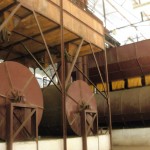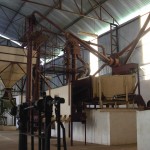Foreign aid, elites and entrepreneurs
On my way to the Sao Nicolau waterfall on the island of Sao Tome, I stumbled upon two Jurassic Parks of failed industrial development.

Ghost factory. By M. Sayagues
At the coffee plantation Monte Café, to the left of its dilapidated pink colonial buildings, stands a huge shed. The caretaker unlocks a gigantic padlock and we step into a surreal décor for a tropical Blade Runner movie.
The shed houses a web of pipes and drums, coffee-processing machinery made by the Brazilian company Pinhalense. It is huge, complex – and never used.
The caretaker remembers when the machines were put in place, about a decade ago, but he never saw them working.
Donors pulled the plug on this US$24 million project after US$14 were spent and a few siphoned off.
The project was sponsored by ESAGRI, the agricultural arm of the Portuguese group Espirito Santo, with US$10.9 from the African Development Bank, totalling US$13 in foreign aid.
I went with a coffee grower who groaned at all the inappropriate elements: for example, a wasteful layout and excessive drying capacity for the production of the 1,800-hectares plantation. The optical scanner for bean selection made him laugh: it required a dust-free, air-conditioned environment, not the dust, humidity and power cuts of Sao Tome.
Going back to the capital after 4 pm, there were no taxis so I start walking. A man in a 4×4 offers me a ride. He is a businessman in his fifties and he insists on showing me his failed textile factory.
In the 1980s, it produced trousers and shirts for both the local market and for Angola, following an agreement between the two allied Marxist governments. When Angola liberalized its economy in the late 1990s, the contract was cancelled and the factory closed.
“Naively, we thought the contract would go on forever and did not look for other markets,” he explained.
Another padlock, another eerily silent space, a 2,000 sq.metres building with rows of old sewing machines.
Two ghost factories: one, the failure of a donor-funded development project. The other, a failure of the post-colonial regime’s industrialisation drive.
Provocative analysis

Improductive from Day One. By M. Sayagues
Africa is littered with abandoned industrial parks and two new, thought-provoking books explain why.
In Dead Aid, Zambian economist Dambisa Moyo argues that foreign aid to Africa has discouraged free enterprise while fuelling corruption and rent-seeking, defined as the use of governmental authority to make and take money without trade or production of wealth.
Aid, she says, lowers the incentive for investment and chokes off growth.
Because aid flows are seen as permanent income, policymakers have no incentive to look for other ways of financing development. Worse, they have no sense of urgency “in remedying Africa’s critical woes.”
In Architects of Poverty, South African author Moeletsi Mbeki argues that African elites obstruct the development of an indigenous entrepreneurial class, seen as a threat to their power. (Read an interview here).
Instead, elites entrench themselves as a “parasitic bureaucratic bourgeoisie…unproductive but wealthy black crony capitalists” who live off state revenues, ignore or exploit peasants, and divert profits to elite consumption or capital flight.
Mbeki notes that one of the biggest scandals is the underinvestment in transport in Africa.
Long wait
The 70 kms drive from Sao Tome to Porto Alegre on the south of the island takes 5 hours and a sturdy car to negotiate potholes.
Few minibuses ply this route because drivers don’t want to destroy their cars. So the trip from Porto Alegre to the capital turns into a day-long journey. That hurts tourism, trade and travel.
Since 7 am, Alice Tavares waited for a bus with her 2 young children and a neighbour’s teenager. They carried school satchels, two baskets of fish, five bundles of clothes and two jerry cans of petrol.

Patient Alice buys a pig. M. Sayagues
The early minibus was full. The second arrived at noon and went half-way to Angolares, where we waited for three hours. Alice bought a freshly butchered pig and stuffed it in a plastic bag. I took photos. We got to the capital after sunset.
How hard can it be to maintain a total of 320 kms of roads in the tiny islands? Since 2007, small billboards brag about a European Union aid project to improve roads. What a joke. Looks more like dead aid managed by the architects of poverty.
En Español
The Latest
 From IPS News
From IPS News- Portable Ginnery Could Revive Kenya’s Ailing Cotton Industry
- Who Should be the Next UN Leader?PART 5
- Who Should be the Next UN Leader?PART 4
- ‘Living in Fear’: Landowners in Uganda’s Oil Field on Brink of Eviction
- Better Incentives Needed to Expand Solar Energy in Cuba
- Africa Pushing Limits To Boost Renewable Energy Supply Chain, Security
- Who Should be the Next UN Leader?PART 3
- Trade Deception Returns in Pan-Africanist Guise
- Solar Power and Biogas Empower Women Farmers in Brazil
- Migration in the Americas: A Dream That Can Turn Deadly
- Online fundraising for IPS Inter Press Service at Razoo













